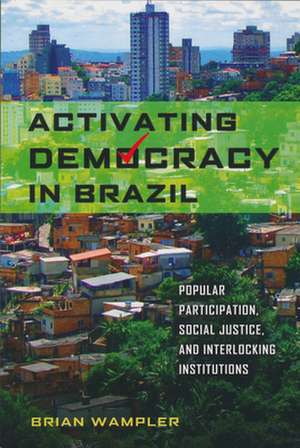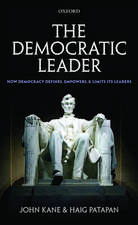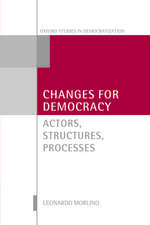Activating Democracy in Brazil – Popular Participation, Social Justice, and Interlocking Institutions: Kellogg Institute Series on Democracy and Development
Autor Brian Wampleren Limba Engleză Paperback – 14 apr 2015
In 1988, Brazil’s Constitution marked the formal establishment of a new democratic regime. In the ensuing two and a half decades, Brazilian citizens, civil society organizations, and public officials have undertaken the slow, arduous task of building new institutions to ensure that Brazilian citizens have access to rights that improve their quality of life, expand their voice and vote, change the distribution of public goods, and deepen the quality of democracy. Civil society activists and ordinary citizens now participate in a multitude of state-sanctioned institutions, including public policy management councils, public policy conferences, participatory budgeting programs, and legislative hearings. Activating Democracy in Brazil examines how the proliferation of democratic institutions in Belo Horizonte, Brazil, has transformed the way in which citizens, CSOs, and political parties work together to change the existing state.
According to Wampler, the 1988 Constitution marks the formal start of the participatory citizenship regime, but there has been tremendous variation in how citizens and public officials have carried it out. This book demonstrates that the variation results from the interplay of five factors: state formation, the development of civil society, government support for citizens’ use of their voice and vote, the degree of public resources available for spending on services and public goods, and the rules that regulate forms of participation, representation, and deliberation within participatory venues. By focusing on multiple democratic institutions over a twenty-year period, this book illustrates how the participatory citizenship regime generates political and social change.
"Activating Democracy in Brazil is an original work. Brian Wampler uses a longitudinal qualitative study of the city of Belo Horizonte, Minas Gerais, Brazil—with which the author has maintained contact directly and indirectly for a long period—to address a number of contemporary challenges in the participation debate. It brings together interviews, observations, survey data, and social indicators to tell a complex story from a variety of different directions." —Peter Spink, São Paulo School of Business Administration, Getulio Vargas Foundation
According to Wampler, the 1988 Constitution marks the formal start of the participatory citizenship regime, but there has been tremendous variation in how citizens and public officials have carried it out. This book demonstrates that the variation results from the interplay of five factors: state formation, the development of civil society, government support for citizens’ use of their voice and vote, the degree of public resources available for spending on services and public goods, and the rules that regulate forms of participation, representation, and deliberation within participatory venues. By focusing on multiple democratic institutions over a twenty-year period, this book illustrates how the participatory citizenship regime generates political and social change.
"Activating Democracy in Brazil is an original work. Brian Wampler uses a longitudinal qualitative study of the city of Belo Horizonte, Minas Gerais, Brazil—with which the author has maintained contact directly and indirectly for a long period—to address a number of contemporary challenges in the participation debate. It brings together interviews, observations, survey data, and social indicators to tell a complex story from a variety of different directions." —Peter Spink, São Paulo School of Business Administration, Getulio Vargas Foundation
Din seria Kellogg Institute Series on Democracy and Development
-
 Preț: 222.01 lei
Preț: 222.01 lei - 19%
 Preț: 450.29 lei
Preț: 450.29 lei -
 Preț: 365.21 lei
Preț: 365.21 lei -
 Preț: 277.23 lei
Preț: 277.23 lei -
 Preț: 277.53 lei
Preț: 277.53 lei -
 Preț: 173.49 lei
Preț: 173.49 lei -
 Preț: 284.82 lei
Preț: 284.82 lei -
 Preț: 299.65 lei
Preț: 299.65 lei -
 Preț: 243.30 lei
Preț: 243.30 lei -
 Preț: 279.23 lei
Preț: 279.23 lei - 27%
 Preț: 701.59 lei
Preț: 701.59 lei -
 Preț: 162.65 lei
Preț: 162.65 lei -
 Preț: 221.38 lei
Preț: 221.38 lei -
 Preț: 216.16 lei
Preț: 216.16 lei -
 Preț: 180.06 lei
Preț: 180.06 lei -
 Preț: 157.58 lei
Preț: 157.58 lei -
 Preț: 232.16 lei
Preț: 232.16 lei - 15%
 Preț: 456.46 lei
Preț: 456.46 lei - 23%
 Preț: 591.49 lei
Preț: 591.49 lei -
 Preț: 276.55 lei
Preț: 276.55 lei - 23%
 Preț: 588.22 lei
Preț: 588.22 lei -
 Preț: 199.49 lei
Preț: 199.49 lei - 27%
 Preț: 699.35 lei
Preț: 699.35 lei -
 Preț: 280.96 lei
Preț: 280.96 lei -
 Preț: 367.12 lei
Preț: 367.12 lei - 27%
 Preț: 697.53 lei
Preț: 697.53 lei -
 Preț: 205.64 lei
Preț: 205.64 lei -
 Preț: 464.59 lei
Preț: 464.59 lei -
 Preț: 443.72 lei
Preț: 443.72 lei -
 Preț: 243.30 lei
Preț: 243.30 lei -
 Preț: 254.37 lei
Preț: 254.37 lei -
 Preț: 324.83 lei
Preț: 324.83 lei -
 Preț: 354.99 lei
Preț: 354.99 lei -
 Preț: 200.26 lei
Preț: 200.26 lei -
 Preț: 325.43 lei
Preț: 325.43 lei -
 Preț: 177.57 lei
Preț: 177.57 lei -
 Preț: 173.91 lei
Preț: 173.91 lei -
 Preț: 275.43 lei
Preț: 275.43 lei -
 Preț: 300.58 lei
Preț: 300.58 lei -
 Preț: 252.64 lei
Preț: 252.64 lei -
 Preț: 275.40 lei
Preț: 275.40 lei -
 Preț: 244.94 lei
Preț: 244.94 lei -
 Preț: 298.67 lei
Preț: 298.67 lei -
 Preț: 156.23 lei
Preț: 156.23 lei
Preț: 281.15 lei
Nou
Puncte Express: 422
Preț estimativ în valută:
53.80€ • 56.17$ • 44.52£
53.80€ • 56.17$ • 44.52£
Carte tipărită la comandă
Livrare economică 04-18 aprilie
Preluare comenzi: 021 569.72.76
Specificații
ISBN-13: 9780268044305
ISBN-10: 0268044309
Pagini: 312
Dimensiuni: 153 x 231 x 21 mm
Greutate: 0.52 kg
Ediția:1st Edition
Editura: MR – University of Notre Dame Press
Seria Kellogg Institute Series on Democracy and Development
ISBN-10: 0268044309
Pagini: 312
Dimensiuni: 153 x 231 x 21 mm
Greutate: 0.52 kg
Ediția:1st Edition
Editura: MR – University of Notre Dame Press
Seria Kellogg Institute Series on Democracy and Development
Recenzii
"Brian Wampler has written the best book so far on the 'real working' of participatory government in Brazil. Wampler provides the reader with a multidimensional analysis of government in Belo Horizonte that goes from the grassroots level to several different government policies. In the end, he manages to provide an excellent view of how participatory policies weave together government and civil society actors. Everyone interested in participatory government should read this book." —Leonardo Avritzer, Federal University of Minas Gerais, Brazil
"Activating Democracy in Brazil answers one of the most important questions of contemporary politics: how did a country notorious for its inequality and clientelism build one of the most successful participatory democracies in the world? In this carefully argued book, Wampler takes us through the institutions, showing how a range of new political practices that emerged out of the 1988 constitution have fundamentally transformed the nature of citizen engagement with the state. The lessons here go far beyond Brazil and should inspire all those interested in seeing the democratic project move forward." —Patrick Heller, Brown University
"Activating Democracy in Brazil is an original work. Brian Wampler uses a longitudinal qualitative study of the city of Belo Horizonte, Minas Gerais, Brazil—with which the author has maintained contact directly and indirectly for a long period—to address a number of contemporary challenges in the participation debate. It brings together interviews, observations, survey data, and social indicators to tell a complex story from a variety of different directions." —Peter Spink, São Paulo School of Business Administration, Getulio Vargas Foundation
"This crucial book by Wampler sets [Brazil's practices of participatory democracy] in a necessary broader context not just for Brazil, but for new democracies generally. Wampler's detailed and clear analysis is based on extensive field research including many interviews with key actors and original survey data." —Choice, Vol.53, No.3, November 2015
"As inspiring books normally do, Activating Democracy in Brazil offers new insights and raises new questions. It also offers directions on how to reinforce democracy through participation. Its framework should pave the way for cross-regional and country comparisons." —Latin American Politics and Society, vol. 58, issue 2, summer 2016
Notă biografică
Brian Wampler is professor of political science at Boise State University. He is the author of Participatory Budgeting in Brazil: Contestation, Cooperation, and Accountability.
















